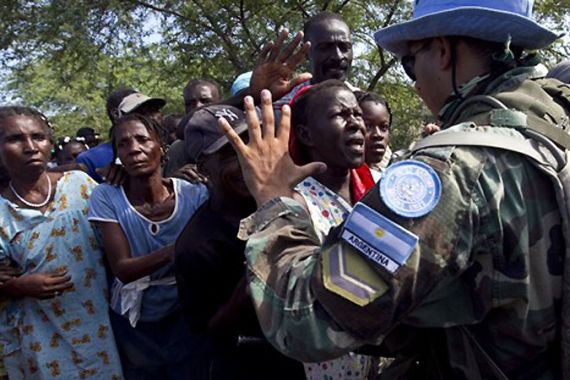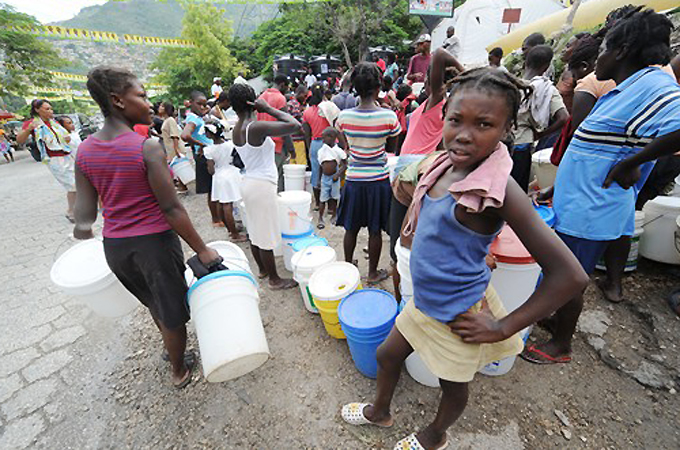Cholera clinic sparks Haiti protest
Angry locals fear location could cause schoolchildren to become infected with the disease that has left nearly 300 dead.

 |
|
Authorities are concerned that a number of those infected say they only drank supposedly treated water [AFP] |
Angry protesters in the Haitian city of Saint Marc have tried to storm a health clinic set up to treat victims of a cholera outbreak, arguing that its location put pupils at a nearby school at risk of infection.
Locals threw stones at the Medecins Sans Frontires (Doctors Without Borders) site on Tuesday and blocked the road to the clinic with tyres and rocks to stop patients from arriving.
Keep reading
list of 4 itemsTurtles swimming to extinction in Malaysia as male hatchlings feel heat
Could shipping containers be the answer to Ghana’s housing crisis?
Thousands protest against over-tourism in Spain’s Canary Islands
Al Jazeera’s Craig Mauro, reporting from the capital Port-au-Prince, said that the protest highlighted the need for more public education.
Those protesting against the clinic’s presence “thought it was too close to the school and would contaminate people”, he said.
UN peacekeepers from Argentina with riot shields were called in to reinforce police and warning shots were heard as the the protest was brought under control.
The French non-governmental organisation insisted that the clinic’s presence was unlikely to cause the spread of the disease.
“They didn’t understood well what was the purpose of this camp and how are we going to treat the patients there, and we believe in this coming days we are going to start to work with this community, to explain them that there is no risk for them to have such a facility to treat these patients inside,” Francoise Otero, a representative for of the organisation in Haiti, said.
The 400-bed facility was intended to rehydrate and treat people with the disease, which has killed at least 284 people and made nearly 3,769 sick.
Outbreak ‘stabilising’
The incident came as health officials said that the outbreak appeared to be stabilising.
“The fact that we are seeing fewer severe cases is positive,” Federica Nogarotto, the MSF field coordinator in Saint-Marc, said.
“It suggests that people are taking precautions and that there is a greater understanding in the community of the need to maintain strict hygiene and to seek medical assistance at the first sign of symptoms.”
However, Ian Rawson, the director of a provincial clinic, told Al Jazeera that he was continuing to see between 20 and 25 new patients a day.
There are also fears that new cases of the disease could accelerate again if it reaches the temporary camps where about 1.3 million of the survicors of January’s devastating earthquake live, with no municipal services, health clinics or schools.
“We are particularly concerned about Port-au-Prince and those in the slum areas as well as in the camps, but we are also preparing for outbreaks in the rest of the country,” Nigel Fisher, the UN Humanitarian Co-ordinator in Haiti, said.
Five suspected cases of the disease have been reported in the capital, but Roc Magloire, Haitian health ministry’s director of epidemiology, said on Tuesday that only one had been confirmed by laboratory tests to be cholera.
Contaminated water
The UN has said that the outbreak is linked to water from Saint-Marc River, which has become contaminated.
“This water behind me, we drink it, we wash our clothes with it, we cook with it; our water safety situation here is a catastrophe,” Renel Consonde, a resident, told Al Jazeera.
But worryingly for those seeking to halt the spread of the illness, a number of those infected say they only drank supposedly treated water.
The treated water was taken from the infected Artibonite River and is the main source of “clean” water for most of the local population. It is distributed in small blue plastic bags taken around the town by the lorryload and then distributed by hand.
Gabriel Thimote, the director general of Haiti’s health department, said that the water in the plastic bags – which bear a label describing the contents as “purified” – may not be safe to drink.
A public health campaign is under way to educate people to boil water, and authorities are looking to solutions such as piping in the water or disinfecting it with chlorine.
The disease, spread through faeces-contaminated drinking water or food, leads to vomiting and watery diarrhoea which, if not treated, can kill a person within hours.